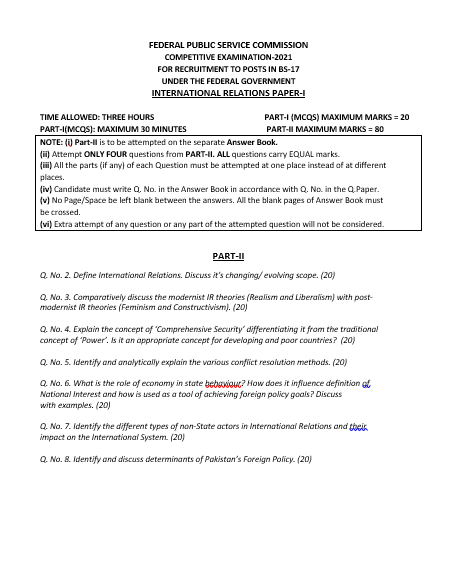CSS International Relations 2021 paper(a)
Q. No. 2. Define International Relations. Discuss its changing/ evolving scope. (20)
Q. No. 3. Comparatively discuss the modernist IR theories (Realism and Liberalism) with post-
modernist IR theories (Feminism and Constructivism). (20)
Q. No. 4. Explain the concept of ‘Comprehensive Security’ differentiating it from the traditional
concept of ‘Power’. Is it an appropriate concept for developing and poor countries? (20)
Q. No. 5. Identify and analytically explain the various conflict resolution methods. (20)
Q. No. 6. What is the role of the economy in state behavior? How does it influence the definition of
National Interest and How is used as a tool of achieving foreign policy goals? Discuss
with examples. (20)
Q. No. 7. Identify the different types of non-state actors in International Relations and their impact on the International System. (20)
Q. No. 8. Identify and discuss determinants of Pakistan’s Foreign Policy. (20)
Summary of Questions:
Q. No. 2. Define International Relations. Discuss its changing/evolving scope.
International Relations (IR) is the study of interactions between states, international organizations, and non-state actors on global issues like politics, economics, and security. Its scope has evolved from focusing solely on state-centric power politics to addressing global challenges such as climate change, human rights, cyber security, and economic interdependence, reflecting the complex and interconnected nature of modern global affairs.
Q. No. 3. Comparatively discuss the modernist IR theories (Realism and Liberalism) with post-modernist IR theories (Feminism and Constructivism).
Realism emphasizes power and state survival, while Liberalism highlights cooperation and institutions in maintaining global peace. Post-modernist theories, such as Feminism and Constructivism, challenge traditional views, focusing on the roles of gender, identity, and social norms in shaping international relations. These newer theories argue that understanding global politics requires considering non-material factors like ideologies and societal constructs.
Q. No. 4. Explain the concept of ‘Comprehensive Security’ differentiating it from the traditional concept of ‘Power.’ Is it an appropriate concept for developing and poor countries?
Comprehensive Security addresses a broad range of threats, including economic stability, environmental challenges, and social welfare, beyond traditional military power. Unlike traditional power-based security, it emphasizes holistic well-being and sustainable development. For developing countries, this approach is more appropriate as it prioritizes human development and resilience over military dominance.
Q. No. 5. Identify and analytically explain the various conflict resolution methods.
Conflict resolution methods include negotiation (direct dialogue between parties), mediation (third-party facilitation), arbitration (binding decisions by a neutral entity), and peacebuilding (long-term efforts to address root causes). Each method varies in complexity and effectiveness, depending on the nature and intensity of the conflict.
Q. No. 6. What is the role of economy in state behavior? How does it influence the definition of National Interest and how is it used as a tool of achieving foreign policy goals? Discuss with examples.
The economy shapes state behavior by influencing national priorities, alliances, and power dynamics. A strong economy allows states to define national interests like trade expansion or regional influence and use economic tools like sanctions, aid, or trade agreements to achieve foreign policy goals. For example, China’s Belt and Road Initiative demonstrates how economic strength is used to extend geopolitical influence.
Q. No. 7. Identify the different types of non-State actors in International Relations and their impact on the International System.
Non-state actors include multinational corporations (economic influence), international organizations (e.g., UN, fostering cooperation), non-governmental organizations (humanitarian work), and terrorist groups (destabilizing regions). These actors impact the global system by challenging state sovereignty, shaping global norms, and influencing policy through lobbying or activism.
Q. No. 8. Identify and discuss determinants of Pakistan’s Foreign Policy.
Pakistan’s foreign policy is shaped by factors such as its geographical location, security concerns (especially with India), economic needs, Islamic ideology, relations with major powers (e.g., the US and China), and regional dynamics like Afghanistan’s stability. These determinants influence its priorities, including defense strategies, economic partnerships, and international alliances.
